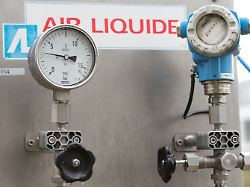Pipeline to Germany
Berlin and Paris plan hydrogen strategy
01/22/2023, 7:00 p.m
The climate goals of the federal government are based, among other things, on access to green hydrogen. This should now be made easier by a new German-French cooperation. The goal is a large hydrogen production plant that will supply all of Europe.
France and Germany want to extend the planned hydrogen line called H2Med between Barcelona and Marseille to Germany. The aim is to facilitate the transport of hydrogen throughout Europe, according to the Franco-German declaration adopted in Paris on the 60th anniversary of the Elysée Treaty. Both countries also want to set up a “high-level working group” on hydrogen at the ministry level to develop “strategic decisions” by the end of April.
“We will also ensure that both renewable and low-carbon hydrogen can be taken into account in Europe’s decarbonization targets,” the statement said. Behind this lies the dilemma that the production of hydrogen requires a great deal of energy. Germany primarily wants to use “green hydrogen” produced with renewable energies. France, on the other hand, relies on so-called “red hydrogen”, which is produced with nuclear energy and emphasizes that it is low in emissions.
On the fringes of the joint Council of Ministers, a Franco-German joint venture between Siemens Energy and Air Liquide was presented, which is involved in the construction of one of the world’s largest production sites for hydrogen in Normandy. For this purpose, electrolysis modules are to be manufactured in Berlin, which are then to be assembled in France. The goal is a large hydrogen production plant in Port-Jérôme near the English Channel with a capacity of 200 megawatts.
